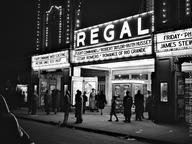Quiz Answer Key and Fun Facts
1. The opening scene features a number of pilgrims making their merry way to Canterbury. In which ancient sport does one of the gentleman pilgrims on horseback participate?
2. Which bespectacled British actor, who went on to enjoy a long career as a member of the 'Carry On' film series team, plays the role of Chillingbourne station master?
3. Land Girl Alison Smith becomes the latest victim of an unusual assault on her arrival in Chillingbourne. Which substance is being deposited in the hair of a number of young ladies from around the village?
4. From which western US state does Bob Johnson, played by real US Army Sergeant John Sweet, declare that he was from after a remark had been made to him involving the city of Chicago?
5. Alison is summoned to visit her future employer, Mr Colpeper, in his office. Shaken by the attack she imagines that she can hear someone inside a cupboard in the corner of his office. What is revealed to her upon opening the wardrobe?
6. Which important civic position is occupied by Mr Thomas Colpeper?
7. In which Chillingbourne hotel are Bob Johnson and Alison Smith accommodated during their stay in the village?
8. British Army Sergeant Peter Gibbs reveals that he had been employed as what type of entertainer before the war?
9. As a part of his plan to reveal the identity of the glue man, Bob Johnson enlists the help of a number of the local children. In which activity are the youngsters engaged when he first approaches them for help?
10. Convincing evidence as to the identity of the Chillingbourne attacker is provided to the three amateur investigators after they mysteriously receive a copy of the Chillingbourne Home Guard detachment duty roster in the mail.
11. During the train journey to Canterbury, who reveals himself to be the person responsible for attacking the local girls?
12. On his arrival in Canterbury Sgt Gibbs, unable to find a senior police officer at the police station to make his report, is directed to which important building?
13. After arriving in Canterbury, Miss Smith makes her way to an old garage in which she had left something a few years earlier. What item of leisure equipment was it that she had stored here?
14. Bob Johnson met his comrade Sergeant Roczinsky in a tea room near Canterbury Cathedral and it is here that he receives his blessing. What items were handed to Bob Johnson by his friend?
15. Sgt Gibbs is offered the opportunity to achieve his life's ambition and play the cathedral's organ. Which famous and hugely popular Baroque organ work does he play?
Source: Author
SisterSeagull
This quiz was reviewed by FunTrivia editor
LadyCaitriona before going online.
Any errors found in FunTrivia content are routinely corrected through our feedback system.
